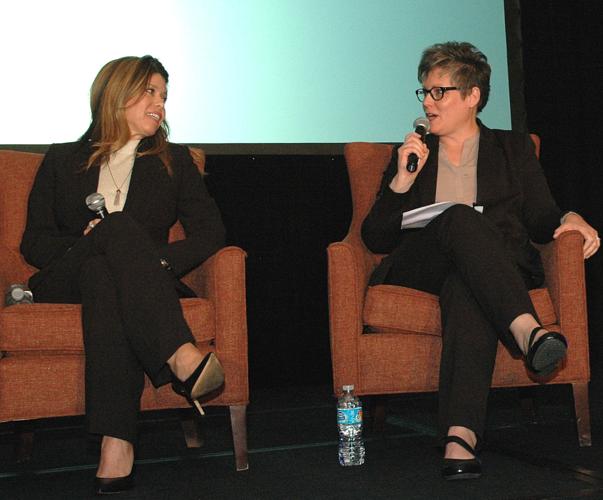PHOENIX — State legislators will try this year to dilute the constitutional right of Arizonans to enact their own laws unfettered by legislative interference.
A series of measures being proposed would change the signature threshold and impose new rules on using paid circulators for initiative petitions. The biggest would ask voters to repeal the measure they approved in 1998 that specifically bars lawmakers from tinkering with laws approved at the ballot box.
There will be other issues consuming lawmakers’ time, of course, when the Legislature’s session begins Monday, ranging from how to divide up the more than $9 billion in state revenues, to who gets tax cuts. Republican Gov. Doug Ducey, in campaigning in 2014, vowed to propose a tax cut every year he is in office. He told Capitol Media Services he remains committed to that pledge.
But don’t underestimate the political fighting that will occur over initiatives and who gets to write — and repeal — state laws.
Voter-approved laws
Arizona’s constitution spells out that citizens are the ultimate lawmakers, and they’ve made use of that right. Voters, for example, approved higher taxes on tobacco and limits on where people can smoke. And it was voters who required funding of early childhood education programs, allowed the medical use of marijuana and approved the state’s first-ever minimum wage.
But it was the recent 58-42 percent approval of Proposition 206 on the Nov. 8 ballot, hiking that minimum wage immediately to $10, taking it to $12 by 2020 and mandating paid time off, that has angered some business leaders. They want new registration requirements on people who collect signatures for money, and to make it easier to challenge those signatures.
There also are moves to require a certain percentage of signatures on ballot propositions to come from the state’s 13 rural counties.
One of the most sweeping comes from Rep. Michelle Ugenti-Rita, R-Scottsdale. She wants to repeal the constitutional provision requiring a hands-off approach by lawmakers after voters have had their say.
Ugenti-Rita said voters are unaware that once they approve something, it’s pretty much forever.
“It makes it difficult for the Legislature to deal with unintended consequences,” she said. “In order to manage economic changes, the Legislature needs to have the ability to adjust policy accordingly.”
She acknowledged that outright repeal would require ratification by the voters who approved the restriction in the first place. So she said she may be willing to accept something less drastic, perhaps a required disclosure on future ballot measures that they can’t be altered by lawmakers.
But Senate Minority Leader Katie Hobbs, D-Phoenix, said the reason voters approved the restriction is because lawmakers “ignored the voice of people that were passing initiatives.”
She noted that in 1996, voters approved the first medical marijuana measure. But the following year lawmakers, insisting that voters must have made a mistake, effectively repealed it by making it subject to federal approval, something that was not going to happen.
So in 1998 proponents put the original measure back on the ballot, where it passed again. They also secured adoption of the Voter Protection Act, which says lawmakers can alter initiatives only if they “further the purpose” of the original measure and only on a three-fourths vote.
Ducey is reacting cautiously to the ideas. “I’m someone who believes you must respect the will of the people,” he said.
But the governor also said he is concerned that laws get cemented into place even as situations change. Ducey said there should be a requirement to review all statutes regularly, whether approved by lawmakers or voters.
“I really love the idea of sunsetting laws,” he said. That would mean sending anything voters approved back to the ballot every decade, forcing proponents to again marshal support.
Gun laws
Guns present a different issue.
With certain exceptions, including schools and court houses, nothing in state law specifically makes public buildings off-limits to weapons. But the operator of a building can declare that guns are not permitted simply by putting a sign at each public entrance. Those who ignore the signs are subject to arrest.
A legislative proposal would allow buildings to be declared gun-free zones only if the operators also install metal detectors and have guards to ensure that no one in the building is armed.
Supporters say the problem with the current system is that those who obey laws will leave their weapons outside or check them in lockers that are supposed to be available; those who are criminals will ignore the signs. That strips the law-abiding citizens of their ability to defend themselves from those who want to cause mayhem, backers say.
Ducey is taking no formal position other than to say he is “a supporter of the Second Amendment.”
Abortion laws
No less controversial are abortion measures.
The historic 1973 decision in Roe v. Wade said states cannot forbid women from terminating a pregnancy. But the high court has said states can regulate the procedure to protect the health of the mother and the life of the fetus and also can outlaw abortions on “viable” fetuses.
So far, Arizona lawmakers have approved — and courts have upheld — a 24-hour waiting period and a requirement for an in-person appointment with a doctor and an ultrasound.
But other rules, like banning abortions after the 20th week and limiting the use of certain drugs to induce an abortion, have been struck down. That’s unlikely to keep abortion foes from trying measures here that are being used by their counterparts in other states.
Aside from the proposed ban at 20-weeks — the point at which some argue a fetus can feel pain — there have been efforts to require doctors to have admitting privileges at nearby hospitals. Texas is pushing ahead with a law that requires the formal burial of fetal remains.
Ducey, who has previously signed various abortion-related measures, suggested anything else that reaches his desk this year will get similar approval.
“I’m pro-life and I’m always going to be on the side of life,” he said.
Minimum wage
The passage of Proposition 206 will have another impact this session.
State health officials say they need more money because the higher wage requirement will force them to increase payments to private companies that provide direct in-home and nursing care. The current reimbursement rate was negotiated based on last year’s $8.05 minimum wage.
Sen. Don Shooter, R-Yuma, wants to go further, suggesting a “do-over.” He said voters might have second thoughts once they figure out there is a $50 million price tag for the coming six months, though the federal government will absorb part of that.
But there is potential fallout for lawmakers telling voters that they really didn’t understand what they were adopting and that it’s OK to pay care workers less than those who work in fast food.
Ducey said only that he’s “all ears” in listening to whatever lawmakers propose on the subject.
Lots of hot items
Other potentially controversial measures include:
- Having the Legislature legalize recreational use of marijuana rather than leaving it for another ballot fight;
- Revamping who sits on the state Board of Education;
- Funding more than $20 billion in needed road construction and repairs;
- Restoring the criminal penalties for violations of campaign-finance laws that legislators repealed last year;
- Barring texting while driving;
- Creating a new post of lieutenant governor who would run as a ticket with the governor;
- Making it a felony to steal a U.S. flag;
- Giving income tax breaks when people make a profit off the sale of U.S. gold coins;
- Allowing officials to deny “unduly burdensome or harassing” requests for public records;
- Authorizing a convention to amend the U.S. Constitution to require a balanced budget;
- Expanding laws that protect private individuals and companies from having to provide services to people whose religious beliefs they find objectionable;
- Providing more immunity to state and local governments from lawsuits over road design;
- Limiting the ability of cities to issue ID cards to people not legally present in this country;
- Reducing the kinds of notices that government agencies must publish in newspapers;
- Revamping how lawsuits are filed over violations of statutes to protect the disabled;
- Altering the state retirement systems to preserve their financial solvency.





